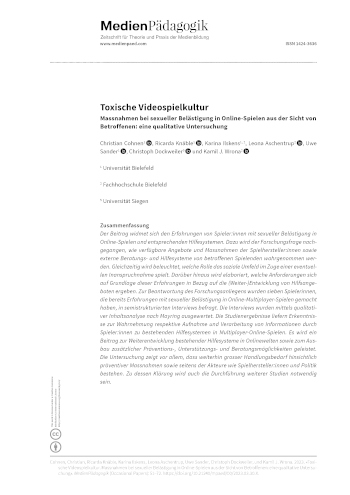Abstract
This research is about the experiences of players with sexual harassment in online games and corresponding help systems. For this purpose, the study examines how the existing offers and measures of the game manufacturers as well as external counseling and help systems are experienced by affected players. At the same time, the role of the social environment is examined and the requirements for the development of help offers resulting from these experiences are elaborated. To answer the research question, seven players who had already experienced sexual harassment in online multiplayer games were questioned in semi-structured interviews. The interviews were analyzed using qualitative content analysis by Mayring. The study results provide insights into gamersʼ perceptions of existing help systems in multiplayer online games. Moreover, a contribution for further development of existing help systems in online worlds as well as for the expansion of additional prevention, support and counseling options is given. In particular, this study shows there is still a great need for action with regard to preventive activities. However, there is a need for more action on the part of stakeholders such as game manufacturers and politicians, which also requires further studies to be conducted.
References
Anti-Defamation League (ADL). 2020. «Free to Play? Hate, Harassment and Positive Social Experiences in Online Games 2020: Hate, Harassment and Positive Social Experiences in Online Games 2020». https://www.adl.org/media/15349/download.
Backes, Herbert, und Christiane Lieb. 2015. «Peer Education». https://leitbegriffe.bzga.de/alphabetisches-verzeichnis/peer-education/.
Barratt, Monica J., und Alexia Maddox. 2016. «Active engagement with stigmatised communities through digital ethnography». Qualitative Research 16 (6): 701–19. https://doi.org/10.1177/1468794116648766.
Beres, Nicole A., Julian Frommel, Elizabeth Reid, Regan L. Mandryk, und Madison Klarkowski. 2021. «Donʼt You Know That Youʼre Toxic: Normalization of Toxicity in Online Gaming». In Proceedings of the 2021 CHI Conference on Human Factors in Computing Systems, herausgegeben von Yoshifumi Kitamura, Aaron Quigley, Katherine Isbister, Takeo Igarashi, Pernille Bjørn und Steven Drucker, 1–15. New York, NY, USA: ACM.
Bourdieu, Pierre. 2005. Die männliche Herrschaft. Frankfurt a. M.: Suhrkamp.
Brehm, Audrey L. 2013. «Navigating the feminine in massively multiplayer online games: gender in World of Warcraft». Frontiers in psychology 4:903. https://doi.org/10.3389/fpsyg.2013.00903.
Bryman, Alan. 2012. Social research methods. 4. Aufl. Oxford: Oxford Univ. Press.
Burnay, Jonathan, Brad J. Bushman, und Frank Larøi. 2019. «Effects of sexualized video games on online sexual harassment». Aggressive behavior 45 (2): 214–23. https://doi.org/10.1002/ab.21811.
Choe, Kwisoon, Sun-Jae Doh, und Jeongmin Ha. 2020. «Adolescentsʼ Experiences and Coping with Sexism Affect both Female and Male Online Gamers in South Korea». Sex Roles 83 (1): 43–53. https://doi.org/10.1007/s11199-019-01094-0.
Cote, Amanda C. 2017. «‹I Can Defend Myself›». Games and Culture 12 (2): 136–55. https://doi.org/10.1177/1555412015587603.
Diehl, Charlotte, Tina Glaser, und Gerd Bohner. 2014. «Face the consequences: Learning about victimʼs suffering reduces sexual harassment myth acceptance and menʼs likelihood to sexually harass». Aggressive behavior 40 (6): 489–503. https://doi.org/10.1002/ab.21553.
Flick, Uwe. 2019. «Gütekriterien qualitativer Sozialforschung». In Handbuch Methoden der empirischen Sozialforschung, herausgegeben von N. Baur und J. Blasius, 473–88. Wiesbaden: Springer VS. https://doi.org/10.1007/978-3-658-21308-4_33.
Fox, Jesse, und Wai Yen Tang. 2017. «Womenʼs experiences with general and sexual harassment in online video games: Rumination, organizational responsiveness, withdrawal, and coping strategies». New Media & Society 19 (8): 1290–1307. https://doi.org/10.1177/1461444816635778.
Hartmann-Strauss, Susanna. 2020. Videotherapie und Videosupervision: Praxishandbuch für Psychotherapie und Beratung Online. Psychotherapie. Berlin, Heidelberg: Springer. https://doi.org/10.1007/978-3-662-62091-5.
Henry, Nicola, und Anastasia Powell. 2018. «Technology-Facilitated Sexual Violence: A Literature Review of Empirical Research». Trauma, violence & abuse 19 (2): 195–208. https://doi.org/10.1177/1524838016650189.
Ivory, James D. 2006. «Still a Manʼs Game: Gender Representation in Online Reviews of Video Games». Mass Communication and Society 9 (1): 103–14. https://doi.org/10.1207/s15327825mcs0901_6.
Ledder, Simon. 2016. «Computerspiele». In Handbuch Medien- und Informationsethik, herausgegeben von Jessica Heesen, 269–74. Stuttgart: J.B. Metzler. https://doi.org/10.1007/978-3-476-05394-7_36.
Letter, J. de, T. van Rooij, und J. van Looy. 2017. «Determinants of harassment in online multiplayer games». Presented at the 67th Annual ICA Conference: Interventions: Communication Research and Practice, San Diego, United States. http://hdl.handle.net/1854/LU-8510816.
Loosen, Wiebke. 2016. «Das Leitfadeninterview – eine unterschätzte Methode». In Handbuch nicht standardisierte Methoden in der Kommunikationswissenschaft. Bd. 6, herausgegeben von Stefanie Averbeck-Lietz und Michael Meyen, 139–55. Wiesbaden: Springer Fachmedien. https://doi.org/10.1007/978-3-658-01656-2_9.
Lopez-Fernandez, Olatz, A. Jess Williams, Mark D. Griffiths, und Daria J. Kuss. 2019. «Female Gaming, Gaming Addiction, and the Role of Women Within Gaming Culture: A Narrative Literature Review». Frontiers in psychiatry 10 Article 454: 1-14. https://doi.org/10.3389/fpsyt.2019.00454.
Mayring, Philipp. 2015. Qualitative Inhaltsanalyse: Grundlagen und Techniken. 12., überarb. Aufl. Weinheim: Beltz.
Mayring, Philipp und Thomas Fenzl. 2019. «Qualitative Inhaltsanalyse». In Handbuch Methoden der empirischen Sozialforschung, herausgegeben von N. Baur und J. Blasius, 633–48. Wiesbaden: Springer VS. https://doi.org/10.1007/978-3-658-21308-4_42.
Mey, Günter, und Paul Sebastian Ruppel. 2018. «Qualitative Forschung». In Sozialpsychologie und Sozialtheorie, herausgegeben von Oliver Decker, 205–44. Wiesbaden: Springer. https://doi.org/10.1007/978-3-531-19564-3_14.
Misoch, Sabina. 2019. Qualitative Interviews. 2., erweiterte und aktualisierte Auflage. De Gruyter Studium. Berlin, Boston: De Gruyter Oldenbourg.
Pina, Afroditi, Theresa A. Gannon, und Benjamin Saunders. 2009. «An overview of the literature on sexual harassment: Perpetrator, theory, and treatment issues». Aggression and Violent Behavior 14 (2): 126–38. https://doi.org/10.1016/j.avb.2009.01.002.
Salminen, Joni, Sercan Sengün, Juan Corporan, Soon-gyo Jung, und Bernard J. Jansen. 2020. «Topic-Driven Toxicity: Exploring the Relationship between Online Toxicity and News Topics». https://doi.org/10.1371/journal.pone.0228723.
Schellong, Julia. 2014. «Akutintervention nach sexueller Gewalt». PiD – Psychotherapie im Dialog 15 (01): 61–63. https://doi.org/10.1055/S-0034-1370820.
Sobieraj, Sarah. 2018. «Bitch, slut, skank, cunt: patterned resistance to womenʼs visibility in digital publics». Information, Communication & Society 21 (11): 1700–1714. https://doi.org/10.1080/1369118X.2017.1348535.
Tang, Wai Yen, und Jesse Fox. 2016. «Menʼs Harassment Behavior in Online Video Games: Personality Traits and Game Factors». Aggressive behavior 42 (6): 513–21. https://doi.org/10.1002/ab.21646.
Verband der deutschen Games-Branche e.V. (VddGB) 2020. «Jahresreport der deutschen Games-Branche 2020». https://www.game.de/wp-content/uploads/2020/08/game-Jahresreport-2020.pdf.
Wanek, Volker, und Karin Schreiner-Kürten. 2021. «Bedeutung und Rolle der Krankenkassen in der Prävention und Gesundheitsförderung». In Prävention und Gesundheitsförderung, herausgegeben von Tiemann M. und M. Mohokum, 139–57. Springer Reference Pflege – Therapie – Gesundheit. Berlin, Heidelberg: Springer. https://doi.org/10.1007/978-3-662-62426-5_9.
Wichmann, Angela. 2019. Quantitative und Qualitative Forschung im Vergleich. Berlin, Heidelberg: Springer. https://doi.org/10.1007/978-3-662-59817-7.

